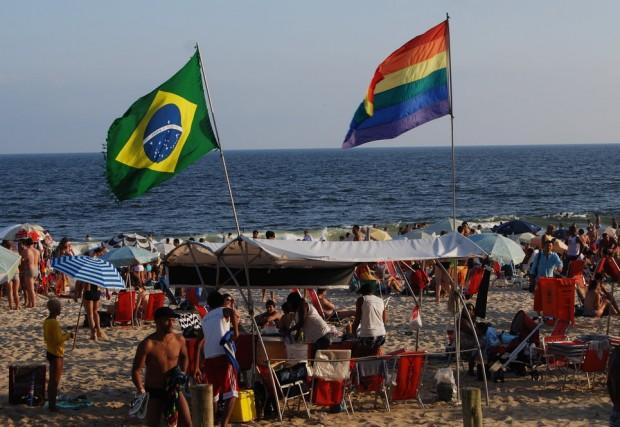(Photo: Jason Margolis)
Brazil took a step closer this week to becoming the third Latin American country to legalize same sex marriage — public notaries cannot deny marriage licenses to same-sex couples. But same-sex marriage still faces some powerful opposition in Brazil.
Being gay in Brazil is something of a paradox. Gay culture is openly celebrated at events like Rio’s Carnival. There’s a popular Brazilian song, “Sin Doesn’t Exist Below The Equator,” made popular by a flamboyantly gay singer.
But Brazil’s machismo culture often also collides with the gay lifestyle. Being gay can bring taunting and ostracism. There’s one place though where it’s okay to be openly gay: the beach, or, at least certain areas of the beach.
The beach in Ipanema is marked by numbered lifeguard posts, about every half mile. Like many beaches in the world, the locals here know where they belong, and they self-segregate into the so-called “Tribes of Ipanema Beach,” along this beautiful 2-mile stretch of sand and water.
“I come to Post 8 because it’s the best part of the beach,” said 21-year-old Bernardo. “It’s very different from all other parts, and there are the gay people here, and I’m gay.”
I asked Bernardo if he feels more comfortable here, as opposed to other areas of the beach.
“Yes, very much,” he said. “Here is an extension of my house. I feel as comfortable here as I feel at home.”
Bernardo says he always runs into friends here at Post 8. Today he ran into Harry, a 26-year-old in a tiny Speedo with hearts on it. Harry’s in ridiculously good shape. He comes here a lot.
“Almost every day, yea I like to keep my suntan going,” he said.
He said he always comes to Post 8.
“I just feel more comfortable in this environment. The other ones, (lifeguard posts) I don’t feel as comfortable. It’s just not like the same crowd, people just look at you in a different way because you’re wearing a tiny little Speedo, or just being a little bit out there.”
Nearby was 30-year-old Arthur Leandro with his partner. He doesn’t come to the beach that often, but he said when he does, he can relax at Post 8. Speaking through an interpreter, he said he doesn’t always feel that way in the rest of Rio.
He said approval of gay people, it’s fake, it’s a façade. He said disapproval is even harder when it comes from within the family. And, he said, sometimes you feel that disapproval at other parts of the beach too.
He used to go to Post 9, but he said there were some things he didn’t like: People would look at him funny when they saw two gay men together.
Post 9 is known as the hip, alternative area. This is also where the pot smokers congregate.
You can rent a chair or umbrella from Marco Antonio Desouza Brandao a friendly guy who was holding a joint. He’s been working this spot for more than a dozen years.
“Every Monday to Monday,” he joked.
He said this is where the “whistle blowers” hang out. When the police used to come, people blew whistles, then everyone would hide their marijuana.
I spoke with one man nearby who was smoking a joint. He’s been busted by the police twice. He didn’t want to give his name.
He said the police don’t really bother them anymore at Post 9 because everybody protects each other. In a sense, the smokers have won this area.
I saw three 16-year-old girls at Post 9 as well, Bruna, Beatriz, and Luisa. They told me a lot of teenagers hang out here. I had to ask about the dope thing.
Speaking in Portuguese, one of them said, “Just because we’re here, that doesn’t mean we’re smoking dope.”
Another girl added, “We know they smoke between the two coconut trees, so we stay away from there.”
Stroll a little further along the beach, and soon you’re in Post 10 territory, and the vibe, again, is noticeably different. This area is known for a mix of older and wealthier people, along with families with small children. 32-year-old Flavio Lovo hangs out here.
“And we’re all with our kids, usually at least for the last three years. Before that we used to go to Post 9.”
I asked him if he’s now “graduated” from Post 9, now that he’s a father.
“Yea, almost like that. When you have kids, you want some peace, and you come here. Because there, you happen to maybe be robbed or mugged, even the marijuana issue, which is a reality.”
I also met two brothers in their early 20’s at Post 10. I asked them if they were a little young for this area.
John Pedro nodded, yea, but, speaking in Portuguese, he said he prefers it here because it’s less crowded than Post 9. And he said there’s a group of gay men at Post 8, which he doesn’t like.
Then there was Rosalia, a woman probably in her 50’s. She’s been coming to the beach in Ipanema for a long time. “Since I have no memory,” she said.
I asked her how people choose their beach tribes, if you’re not a stoner, or a gay guy, or a teenager. I mean, how does she decide where to go?
She points over at some apartment buildings.
“When I was a little child, my parents lived there, so…”
So, sometimes you don’t choose your beach tribe, it chooses you.
